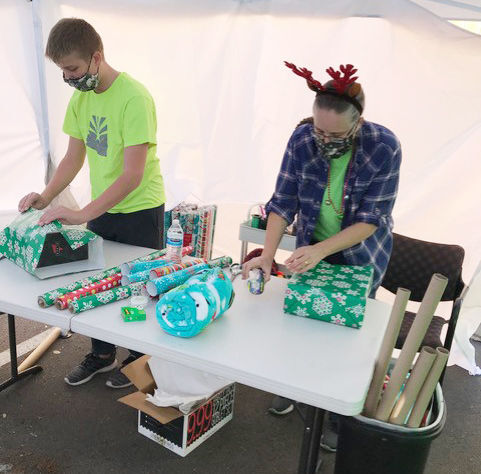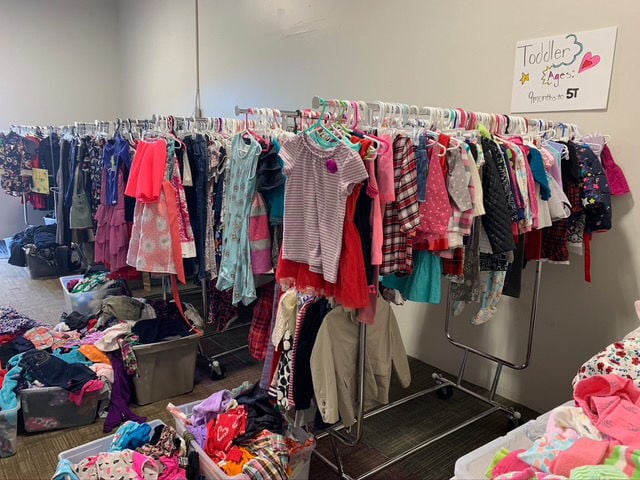Spreading Threads is about more than gifting clothing to foster kids: It is about expanding resources to improve quality of life and promote dignity for children and families in the foster care system.
“I believe that if we don’t take care of these kids now as a society and as a community, we will pay for it somewhere, at some point, down the line. We have a responsibility to help these kids: They are residents of this city. They are our neighbors,” said Michele Wright, who co-founded Spreading Threads with her wife, Michele Bennett.
The couple realized the need for the nonprofit when they became involved with the foster care system about 17 years ago; they have since adopted four children out of foster care.
Wright said that soon after they started their foster care journey, the economy took a downturn and services to foster parents were cut, disrupting the already limited resources.
“Foster parents used to get $300 for clothing for a foster child, and then in 2008 or 2009 it was cut to $150 and it remains the same today: $150 per year to clothe your foster kid. Obviously that is grossly inadequate, and that is why we started the clothing bank,” said Wright.
Additionally, Wright emphasized that for kinship families — foster families that are friends or extended family members of the children in care — the stipends from the state are reduced considerably.
“At least 60% of foster placements in Southern Arizona are kinship placements, and COVID has taken a toll on all families, including kinship families. Kinship families are usually not licensed foster parents — they are often a grandma or an aunt or family friend. If they are not licensed, they receive about 10% of the amount licensed foster parents receive. A kinship family might receive $60 to $70 per month to care for a child, and the person who pays the biggest price is always the kid if we fall short,” said Wright.
The growth of the grassroots nonprofit is testament to the need.
In 2018, the organization leased a 1,300-square-foot space in which to store gently used and new clothing, shoes, toys, books, school supplies and other basic necessities. The supplies are free to foster and adoptive parents during Spreading Threads Clothing Bank Events on the second Saturday of each month at the facility at 1870 W. Prince Road, Suite 54. The next event is from 9 a.m. to 1 p.m. Saturday, Jan. 9. Children, except for group home teens, are restricted from attending the event, and pandemic protocol, including face masks and social distancing, will be followed.
Wright said Spreading Threads also frequently performs “emergency pulls” and arranges delivery or pick-up of clothing and supplies for foster and kinship parents, who may receive only an hour notice before they receive a child. Emergency pulls have also been particularly helpful during the pandemic, according to Wright.

Spreading Threads Clothing Bank accepts in-kind donations of new and gently used clothing for newborns to youth age 18.
Genevieve Clayton said that service was invaluable to her family when they received placement of a 9-month-old girl a few weeks ago. This is Clayton’s 10th placement, and although she has a bin of clothing on hand for different ages, she had no winter clothing in the correct size.
“When she came to us, she was very clingy and needy, and dropping everything and running out to shop is not on the forefront of anyone’s mind, especially with the holidays and crowds and the pandemic,” said Clayton, who submitted a request for winter clothes to Spreading Threads, which supplied two bags of items — one gently used and one new — within 24 hours.
“Spreading Threads has always been wonderful and now, they are even more so. Michele has stepped in and helped a great deal, and we are just one family,” Clayton said. “She has done that for so many, and it is very much appreciated. Clearly it takes someone with a huge heart to do what she does.”
Clayton emphasized that the support is vital for foster parents, both emotionally and financially.
“I calculated it once, and we receive around 94 cents at day in stipends, and when you are taking care of a baby, most of that money goes toward diapers and wipes,” Clayton said. “Yes, we receive money, but honestly it goes quickly and doesn’t cover all the expenses. We don’t spend based on what we are reimbursed: We spend based on what a child needs, so having a place like Spreading Threads makes a huge difference in what we can provide for foster kids.”
Another foster parent agrees with that assessment.
Mark, who prefers his last name be withheld to protect the privacy of his four foster children, said that Spreading Threads helps many foster parents fill in the gaps before they receive any support from the state.
“DCS doesn’t pay you up front; you get payment a month after you have the children and submit the paperwork. Lots of costs to foster parents are out of pocket initially. Everything is a month or more behind. Many people in the community might not realize foster parents don’t get paid immediately or prior to the child showing up to your house,” Mark said.
In addition to providing emergency pulls of clothing, pajamas, bedding and other supplies for several placements, Mark said that Spreading Threads also offered an opportunity for his two 6-year-old children to “shop” for free holiday gifts in December.
Whenever possible, Wright encourages the public to help meet that need by supporting foster and kinship children and families through in-kind donations or financial contributions to nonprofits such as Spreading Threads, which has continued to grow.
It is in the process of securing a 7,500-square-foot building that will offer warehouse space along with a reading and game room for children as well as areas for use by other foster care and adoptive agencies.
“We want to open the space to support groups or group homes and other nonprofits that work in foster care in order to keep serving the community as many moments of the day as possible,” said Wright.
Ultimately, Wright said the goal is simple: to give foster and adoptive children their dignity back.
“Dignity and self-worth goes a long way, and the message you send a kid when put them in clothes that don’t fit or aren’t clean is that, ‘You are not worth that much.’ We try to prevent that and give them a rock star experience. Everyone deserves that,” she said.





